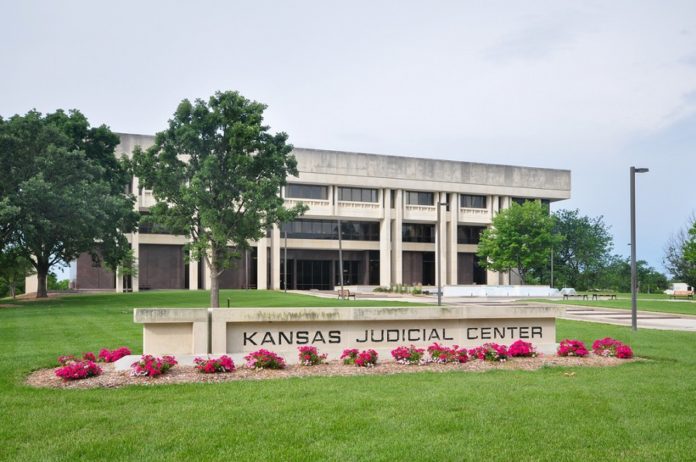Kansas Supreme Court justices on Thursday pressed the school district plaintiffs on just how much money it would take to constitutionally fund public education.
They quizzed Alan Rupe — the lawyer for the school districts suing the state — about whether constitutional education funding is an elusive goal that is impossible to reach.
“I’ve been on this court 14 years, and 11 of those 14 years there has been ongoing school finance litigation,” said Justice Eric Rosen.
“Is there ever crossing the finish line in these types of cases?” Rosen asked. “Or are you going to be back here three or four years down the road making the same argument that you just made — the future of our children are casualties of the process. Is this just indefinite?
“Where does this ever end?”
Rupe, who has been involved in school litigation since May 1989, thought school funding ligation would end.
“At this moment right now, looking at what the Legislature did in the last session in a bipartisan action…I think we’re getting real close,” Rupe said. “I think if this court gives the Legislature, the governor and the state Board of Education the path to $3.7 billion that they set as a target, we get there.”
The Legislature put $90 million into schools to account for the inflation that the Supreme Court ordered last year when it generally agreed that the state was constitutionally funding education. The $90 million is forwarded for each of the following three years.
However, the school district plaintiffs argued that the state fell $270 million short of reaching the $3.7 billion that the state had set as a funding goal, a benchmark some justices seemed to question.
“The problem as I see it, constitutional compliance seems to be attached to or tethered to whatever the issues are of the present case, and then two or three years from now, it could be something else,” Rosen said in response to Rupe.
“That’s part of the phenomena that’s frustrating here, is that compliance seems to be fixed, but really it’s a moving type of target,” Rosen said.
Rupe responded, “As long as we have a constitution and as long as we have unconstitutional action, there will always be tension over compliance, and school funding isn’t any different than any other constitutional issue. Maybe the difference is the tenacity of the plaintiffs.”
But Rosen disagreed, saying school funding seemed different.
“In some cases, you can fix it and it’s done,” he said. “In this, it’s a constant changing phenomena.”
Rupe came back, saying he hoped the state never reached a point where it wasn’t providing Kansas school children with a suitable education.
“We’re not doing it now,” he said. “If that takes another lawsuit in 2024 because the Legislature backed up on something and this court has dismissed the case, I hope I am at the podium then. The kids are worth it.”
Supreme Court Justice Dan Biles seemed suspect of the plaintiffs’ demands in the case. He argued that just because the state set $3.7 billion as a goal of education funding doesn’t mean that’s the minimum level of what’s constitutionally required.
“Why isn’t it proper for the Legislature to come in at a lower number as long as it’s reasonably calculated to meet the Rose standards?” said Biles, alluding to a broad set of guidelines referenced by the Kansas Supreme Court in a 2014 decision.
He noted that the state is spending a lot more money on education now than it was years ago during the trial phase, but Rupe said the state is still not meeting the spending target.
“You’re equating the target to the constitution, and I don’t think you can do that,” Biles said. “I don’t understand why you think that. The target can be above the constitution and they can decide they don’t want to meet the target as long as they’re meeting the constitution.”
Biles, however, didn’t seem ready to give up jurisdiction of the school funding case just yet, noting that the Legislature reneged on funding promises made 14 or 15 years ago.
“I got to tell you, I don’t have a lot of sympathy for the idea of dismissing this lawsuit,” he said.
“If were to dismiss this lawsuit now and next year the Legislature went back and put in that block grant program that we’ve already said was structurally constitutional, the law of this case would prevent that law from being implemented,” Biles said.
By keeping jurisdiction, the plaintiffs could go to the Supreme Court to stop an unconstitutional action instead of starting the process over again at the trial court, Biles said.
Toby Crouse, the state’s solicitor general, said he understood the court’s concerns. But he argued there is a separation of powers.
“If the court retains jurisdiction, that legislative process of going back and forth with the stakeholders of the educational community at some level is thwarted,” Crouse said.
Biles seemed skeptical.
“The problem I have with that argument is you’re not in compliance until you get to the end of the years on this deal,” he said.
“It’s kind of like a desegregation case where you’ve got to achieve a certain goal before you’re in compliance,” he said. “Until you get into compliance, it seems it’s fair for the court to hold the case in abeyance to make sure you do what you promise.”
















